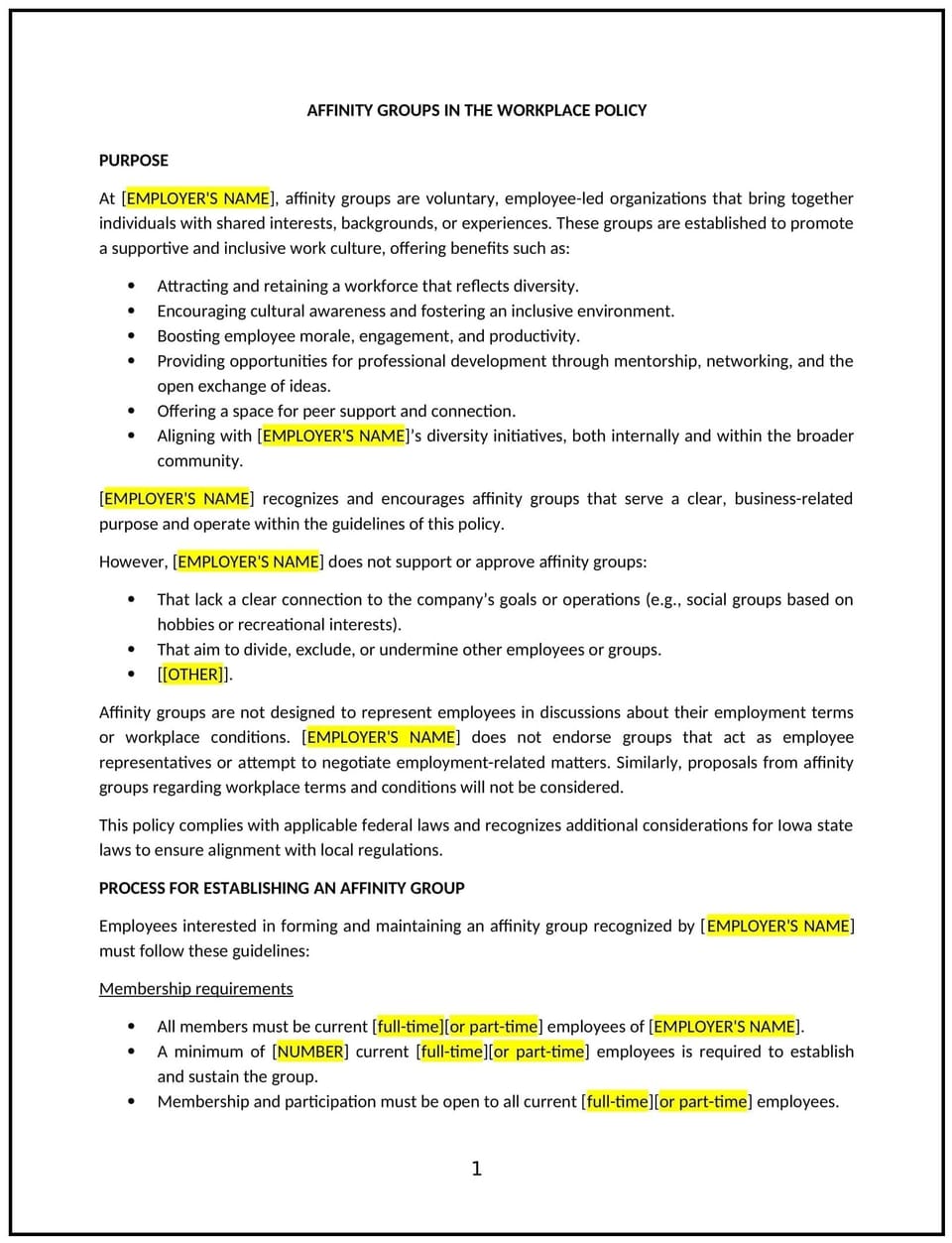Affinity groups in the workplace policy (Iowa): Free template

Affinity groups in the workplace policy (Iowa)
An affinity groups policy helps Iowa businesses foster a more inclusive and supportive work environment by encouraging employees with shared interests, backgrounds, or experiences to connect. These groups can focus on diversity, professional development, or common interests, helping to strengthen workplace culture.
This policy outlines guidelines for forming, managing, and supporting affinity groups within an organization. It helps businesses establish a framework that balances inclusivity with operational needs while aligning with Iowa’s employment and workplace laws.
By implementing this policy, businesses in Iowa can promote workplace engagement, improve employee satisfaction, and encourage collaboration across teams.
How to use this affinity groups in the workplace policy (Iowa)
- Define affinity groups: Clearly explain what qualifies as an affinity group, such as employee resource groups (ERGs), professional development groups, or cultural associations.
- Establish eligibility criteria: Outline who can form or join an affinity group and the process for doing so.
- Set group objectives: Encourage each affinity group to define its mission, goals, and activities to align with workplace values.
- Determine company support: Specify the resources available to groups, such as meeting spaces, communication tools, or company sponsorship.
- Assign leadership roles: Clarify whether groups should have designated leaders, committees, or rotating leadership structures.
- Create participation guidelines: Outline expected behaviors to maintain a respectful and inclusive environment.
- Monitor effectiveness: Encourage periodic reviews to assess the impact of affinity groups on workplace culture.
- Update as needed: Modify the policy to reflect changes in Iowa business practices, employment trends, or company goals.
Benefits of using this affinity groups in the workplace policy (Iowa)
This policy offers several advantages for Iowa businesses:
- Strengthens workplace culture: Encourages collaboration and a sense of belonging among employees.
- Supports diversity and inclusion: Helps employees from different backgrounds connect and share experiences.
- Improves employee retention: Provides opportunities for engagement, which can increase job satisfaction and reduce turnover.
- Enhances professional development: Affinity groups can offer networking, mentorship, and learning opportunities.
- Encourages innovation: Fosters knowledge-sharing and collaboration, leading to creative solutions.
- Aligns with Iowa workforce trends: Supports initiatives that promote engagement and employee well-being.
Tips for using this affinity groups in the workplace policy (Iowa)
- Define clear goals: Encourage groups to establish specific objectives that align with company values.
- Promote participation: Ensure employees are aware of available affinity groups and how to join.
- Provide guidance: Offer resources and leadership training to help affinity groups function effectively.
- Encourage collaboration: Allow different groups to coordinate activities and initiatives.
- Review impact: Regularly assess the effectiveness of affinity groups and adjust support as needed.
Q: How can businesses in Iowa support affinity groups?
A: Businesses should provide clear guidelines, allocate resources like meeting spaces, and promote group activities to encourage participation.
Q: What types of affinity groups are most common in Iowa workplaces?
A: Common groups include diversity and inclusion groups, professional development networks, and social interest groups that foster workplace connections.
Q: Should businesses set rules for affinity groups?
A: Businesses should establish guidelines to ensure that affinity groups align with company values, promote inclusivity, and operate in a professional manner.
Q: Can businesses provide financial support for affinity groups?
A: Businesses should evaluate their budget and determine whether they can offer financial support, such as funding for events, materials, or professional development activities.
Q: How often should businesses review their affinity groups policy?
A: Businesses should review the policy annually or as workplace needs evolve to ensure it remains relevant and effective.
Q: How can businesses encourage employee participation in affinity groups?
A: Businesses should promote groups through internal communications, leadership endorsement, and company events to increase awareness and engagement.
Q: What should businesses do if conflicts arise within an affinity group?
A: Businesses should provide a framework for conflict resolution and encourage open communication to address issues professionally and constructively.
Q: Can remote employees participate in affinity groups?
A: Businesses should allow remote employees to engage through virtual meetings, online forums, or hybrid events to ensure inclusivity.
This article contains general legal information and does not contain legal advice. Cobrief is not a law firm or a substitute for an attorney or law firm. The law is complex and changes often. For legal advice, please ask a lawyer.


